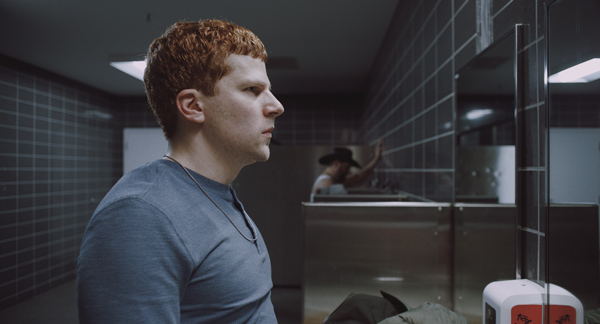Wrecked Ralph: Trengove Gazes into the Weaponization of Masculinity in Unsettling Character Study
 Playwright and activist Eve Ensler commented on a 2017 panel regarding how “the tyranny of masculinity and the tyranny of patriarchy…has been much more deadly to men than it has to women. It hasn’t killed our hearts. It’s killed men’s hearts.” Ralphie, the troubled protagonist of John Trengove’s sophomore feature, Manodrome, is at this very precipice, on the verge of losing his heart. Like his 2017 debut, The Wound (read review), in which a tribal ritual unleashes sexual repressions with dire consequences, he focuses on a similar homosocial sphere in the US, creating a fictional libertarian masculinity cult utilizing a now commonplace rhetoric amongst several groups vocalizing a desire to reclaim something they believe they’ve lost, which is undaunted dominion.
Playwright and activist Eve Ensler commented on a 2017 panel regarding how “the tyranny of masculinity and the tyranny of patriarchy…has been much more deadly to men than it has to women. It hasn’t killed our hearts. It’s killed men’s hearts.” Ralphie, the troubled protagonist of John Trengove’s sophomore feature, Manodrome, is at this very precipice, on the verge of losing his heart. Like his 2017 debut, The Wound (read review), in which a tribal ritual unleashes sexual repressions with dire consequences, he focuses on a similar homosocial sphere in the US, creating a fictional libertarian masculinity cult utilizing a now commonplace rhetoric amongst several groups vocalizing a desire to reclaim something they believe they’ve lost, which is undaunted dominion.
Fragile masculinity, particularly white fragile masculinity, provides a queasy, nerve-rattling tension from which there’s no escape, immediately evident in our leery introduction of Ralphie until inevitably everything spins out of control. And then spins some more. An impressive Jesse Eisenberg courts our empathy and our rage as a wounded man broken down by confrontation with the one thing he cannot fathom – kindness.
Riley Keough makes a cameo as a mother nursing her baby in the back seat of Uber driver Ralphie’s (Eisenberg) car. Immediately unnerved at his gaze, she demands he pull over to let her exit. Ralph’s curiosity and repulsion of the post-natal female body becomes more overt through his interactions with girlfriend, Sal (Odessa Young), about to give birth to their first child, though neither of them seem inherently prepared for it. Since he’d recently been laid off from his job alongside his friend, Jason (Philip Ettinger), Ralph’s main interest has been pumping iron at the gym as he attempts to transform himself into the hypermasculine form he’s drawn to. When Jason mentions he has a group of friends looking to help out men in their situation, Ralph is introduced to Dan (Adrien Brody), the head of a group called the Manodromes. As their rhetoric on masculinity is revealed to Ralphie, he finds himself drawn to Dan (after induction to the group, it’s Dad Dan), a man who taps with surgical precision into the young man’s vulnerabilities. But not even Dan seems able to predict what’s going to be unleashed in Ralphie.

Ralphie’s Christmas related trauma (recalling another famous Ralphie from 1983’s A Christmas Story) bears the strange fruit of convenience by the third act, as if he’s been karmically cursed. The Manodromes seem to be the products of an inverse gender abandonment, many of them vocalizing inherent mommy issues and sworn to celibacy, completely cleansing themselves of any relationship to femininity in a world they disparage as the ‘gynosphere.’ Beyond their gripes, it’s unclear what their ultimate goal is, reminiscent of incels or even the Aryan Brotherhood opening their arms to men of color to unite against their common enemy, women.
Adrien Brody’s Dad Dan is confusing, clearly fostering something terribly unbalanced in Ralphie, while the rest of his flock seems content with somewhat uplifting group activities. Strangely, Dad Dan’s sinister qualities are overridden by kindness, part of his inherent manipulation of this myriad of men who are desiring to be seen and feel loved. Ironically, they’re ‘chosen family,’ a term lifted from the LGBTQ+ community’s template of resiliency, with self-made houses not unlike those of the ballroom scene. Ralph, however, has a multitude of issues with some complex comorbidity, one of which seems to be significant body issues. His relationship to Odessa Young’s Sal feels born out of survival, though they’ve never quite grown up, each sporting colorful hairdos from the Dr. Seuss palette. But as Ralphie pivots away from his routine, the film sashays into violent outbreaks, which appear to be fantasies he’s acting out in his mind, though there are inherent ambiguities to what’s real vs. fantasy seeing as he’s also downing bottles of Percocet.
Eventually, it becomes clear Ralphie has also repressed his sexuality, which plays out in the film’s most fascinating tangent between himself and Ahmet (Sallieu Sesay), a musclebound Black man at the gym who realizes there’s more than violence hiding beneath his gaze. DP Wyatt Garfield (Mediterranea, 2015; Resurrection, 2022) enhances the sense of menace, the camera skulking around corners like an animal lurking until the panic in the film’s third act turns into flighty desperation. Ralphie’s actions are ultimately reprehensible, and Trengove denies easy resolutions by suggesting redemption is as illusory a possibility as masculinity is a superiority.
Reviewed on February 18th at the 2023 Berlin International Film Festival – Competition. 95 mins.
★★★½/☆☆☆☆☆


